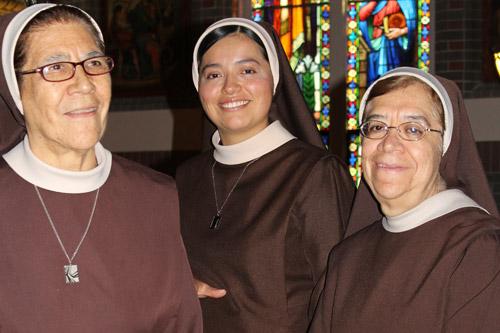
CONWAY — As Father John Marconi greeted worshipers following daily Mass at St. Joseph Church in Conway recently, longtime parishioner A.J. Humbuchen, offered his pastor a grin.
“Man, it is so good to have the sisters back at St. Joseph’s,” Hambuchen said.
The remark was not the first inspired by the Sept. 3 arrival of the Missionary Carmelites of St. Teresa. In fact, Sisters Rosa Elena Perez, Elsa Miranda and Dulce Maria Cordoba, CMST, can’t go anywhere without someone greeting them, asking questions, offering to feed them or, like parishioner Joyce Meyer, just holding their hands and smiling.
“When I drove up for adoration, I saw the three of them walking by and I thought, ‘Where am I?’” said Meyer, taught by the Sisters of Mercy at Mount St. Mary Academy in the 1950s. “Seeing them, you just feel your religion a little deeper, it touches your heart a little more. It’s just great.”
“This is a very open community, they have an excellent sense of community they are giving us,” said Sister Elsa, 65. “We have been given a very warm welcome.”
All three sisters are Mexican-born — in fact, from the same state of Michoacán along the country’s southwestern coast — but the United States is familiar territory. Sister Rosa, 27, grew up in California and the other two have been working in the states for decades. This also isn’t the first Arkansas trip for two of them: Sister Rosa visited Springdale during her discernment and Sister Dulce Maria, 81, worked in Hispanic ministry at St. Raphael Church.
Since arriving, they have quickly settled into their residence and daily routine. Three days a week, they gather at 6 a.m. for prayer in the St. Joseph chapel. They attend daily Mass before breakfast, then report to the church offices.
“Here is a beautiful community,” Sister Dulce Maria said. “Here we have experienced a familiar home, from the people.”
It may seem odd that the centers of such attention are three women who have dedicated their lives to serving others, but what they represent to the facets of the parish community has struck a chord. They are at once reminiscent and promissory — a reconnection to the parish’s heritage and a rudder to steer it to the increasingly complex congregation of tomorrow.
Father Marconi lets a smile creep over his face. “It’s just such a blessing to have them here. It just feels … right.”
St. Joseph’s history is rooted in religious orders. Founded by the Holy Ghost Fathers, the parish has hosted three different women’s orders — Sisters of St. Joseph of Cluny, School Sisters of Notre Dame and Sisters of St. Joseph du Puy — the last of whom left more than 30 years ago.
“The first time they went into the lunchroom, the students were very curious. Many of them had never seen a nun before,” Father Marconi said. “They kept asking questions, ‘Who are they, again?’ ‘Why are they wearing that?’”
The parish spent a year planning for the nuns’ arrival. When it became known that the Carmelites would leave Springdale in June, Bishop Anthony B. Taylor asked if another parish would be willing to support their ministry. Father Marconi, who has learned to celebrate Mass in Spanish, jumped at the opportunity to better connect with the area’s Hispanic Catholics.
“It was really a no-brainer,” Father Marconi said. “I saw it as a way to better take care of 300 of my families.”
Many other Hispanics throughout Faulkner County are attracted to other Catholic parishes or drifting into other denominations altogether in search of cultural connection.
“I want to know them better as a people and as a culture,” Father Marconi said. “I want to know what’s important to them and everything that’s different from how I grew up. I’m learning and growing and the sisters are very helpful in that.”
“We are the bridge between the Hispanic and English-speaking communities,” said Sister Elsa. “We are building the bridge.”
The sisters are off to a fast start. Their formal outreach hasn’t even started and they’ve already received several dinner invitations to the homes of Hispanic families. The initial shock among the students is also wearing off.
“One little girl, Anna, came running up to me the other day and said, ‘Sister, when I grow up, I want to be just like you!’” Sister Rosa said.
Please read our Comments Policy before posting.
Article comments powered by Disqus Winning directory photo honors Our Lady of Guadalupe
Winning directory photo honors Our Lady of Guadalupe
 St. Paul says: How does the Bible define love?
St. Paul says: How does the Bible define love?
 6 steps to getting married in Diocese of Little Rock
6 steps to getting married in Diocese of Little Rock
 Most frequently asked questions on Catholic marriage
Most frequently asked questions on Catholic marriage
 St. Joseph a model of solidarity with immigrants
St. Joseph a model of solidarity with immigrants
 Two gifts after Jesus’ death: Virgin Mary and Eucharist
Two gifts after Jesus’ death: Virgin Mary and Eucharist
 Why we have an altar, and not just a communion table
Why we have an altar, and not just a communion table
 Pope: Wars should be resolved through nonviolence
Pope: Wars should be resolved through nonviolence
 Living relationship with Jesus Christ in the Eucharist
Living relationship with Jesus Christ in the Eucharist